| Listing 1 - 10 of 219 | << page >> |
Sort by
|
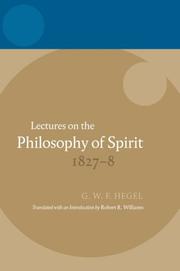
ISBN: 9780199217021 0199217025 Year: 2011 Publisher: Oxford Oxford University Press
Abstract | Keywords | Export | Availability | Bookmark
 Loading...
Loading...Choose an application
- Reference Manager
- EndNote
- RefWorks (Direct export to RefWorks)
Philosophical anthropology --- Conscience --- Spirit --- Pneuma --- Pneumatology (Philosophy) --- Pneumatology (Theology) --- Holy Spirit --- Soul --- Ethics --- Guilt --- Superego
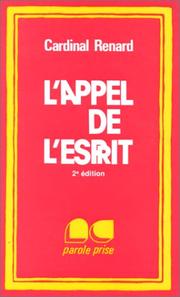
ISBN: 2853130150 9782853130158 Year: 1976 Publisher: Paris Nouvelle Cité
Abstract | Keywords | Export | Availability | Bookmark
 Loading...
Loading...Choose an application
- Reference Manager
- EndNote
- RefWorks (Direct export to RefWorks)
Christian spirituality --- Holy Spirit --- #gsdb2 --- Holy Ghost --- Paraclete --- Pneumatology (Theology) --- Spirit, Holy --- God (Christianity) --- Theology, Doctrinal --- Spirit --- Trinity
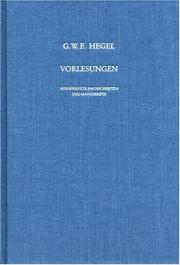
ISBN: 3787310053 9783787310050 Year: 1994 Volume: 13 Publisher: Hamburg Meiner
Abstract | Keywords | Export | Availability | Bookmark
 Loading...
Loading...Choose an application
- Reference Manager
- EndNote
- RefWorks (Direct export to RefWorks)
Philosophical anthropology --- Spirit. --- Conscience. --- Conscience --- Spirit --- Pneuma --- Pneumatology (Philosophy) --- Pneumatology (Theology) --- Holy Spirit --- Soul --- Ethics --- Guilt --- Superego
Book
ISBN: 2213003173 9782213003177 Year: 1976 Publisher: Paris Fayard
Abstract | Keywords | Export | Availability | Bookmark
 Loading...
Loading...Choose an application
- Reference Manager
- EndNote
- RefWorks (Direct export to RefWorks)
Holy Spirit --- #GROL:SEMI-231.3 --- Holy Ghost --- Paraclete --- Pneumatology (Theology) --- Spirit, Holy --- God (Christianity) --- Theology, Doctrinal --- Spirit --- Trinity
Book
ISBN: 9780802866929 0802866921 Year: 2012 Publisher: Grand Rapids W.B. Eerdmans Publishing Company
Abstract | Keywords | Export | Availability | Bookmark
 Loading...
Loading...Choose an application
- Reference Manager
- EndNote
- RefWorks (Direct export to RefWorks)
Religion and science --- Creation --- Spirit --- 215 --- Pneuma --- Pneumatology (Philosophy) --- Pneumatology (Theology) --- Holy Spirit --- Soul --- Godsdienst en wetenschap
Book
ISBN: 9781844676163 Year: 2010 Publisher: London Verso
Abstract | Keywords | Export | Availability | Bookmark
 Loading...
Loading...Choose an application
- Reference Manager
- EndNote
- RefWorks (Direct export to RefWorks)
Hegel, Georg W.F. --- Phenomenology --- Spirit --- Pneuma --- Pneumatology (Philosophy) --- Pneumatology (Theology) --- Holy Spirit --- Soul --- Philosophy, Modern --- Hegel, Georg Wilhelm Friedrich,
Book
ISBN: 9782503586403 2503586406 Year: 2021 Volume: 92 Publisher: Turnhout Brepols
Abstract | Keywords | Export | Availability | Bookmark
 Loading...
Loading...Choose an application
- Reference Manager
- EndNote
- RefWorks (Direct export to RefWorks)
The most original and innovative Byzantine text on the Filioque discussion. The 'Dialogi sex de processione Spiritus Sancti' by Niketas, metropolitan of Thessaloniki, once known unproperly as "of Maroneia", is one of the most outstanding polemical works against the Latins, written in form of a dialogue, of the Comnenian era. Niketas (first half of the 12th c.) is commonly considered a "latinophrone" theologian, since he was "prepared to accept the Latin wording" (A. Kazhdan, 'Change in Byzantine Culture in the Eleventh and Twelfth Centuries', Berkeley 1985, p. 189), and his 'Dialogi' are the only Byzantine twelfth-century writings on the discussions with the Latin Church where Greek and Latin speakers reach an agreement on the procession of the Holy Spirit "through the Son", and where the Latin's arguments turn out to be ultimately longer and more persuasive than the Greek's mostly brief and provocative replies. The critical edition of these influential six dialogues, edited for the first time in their complete form, offer one of the most original and innovative text on the Filioque discussion and witness to the existence in the twelfth century of an uncommon way of interpreting the inter-Trinitarian relationship and to the usage of Aristotelic philosophy for interpreting the procession of the Holy Spirit.
Holy Spirit --- Procession --- Nicetas, --- Holy Ghost --- Paraclete --- Pneumatology (Theology) --- Spirit, Holy --- God (Christianity) --- Theology, Doctrinal --- Spirit --- Trinity --- Medieval Greek literature
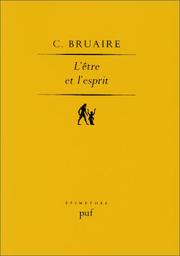
ISBN: 2130380271 9782130380276 Year: 1983 Publisher: Paris PUF
Abstract | Keywords | Export | Availability | Bookmark
 Loading...
Loading...Choose an application
- Reference Manager
- EndNote
- RefWorks (Direct export to RefWorks)
Metaphysics --- Ontology. --- Spirit. --- Ontologie --- Esprit --- Ontology --- Spirit --- Pneuma --- Pneumatology (Philosophy) --- Pneumatology (Theology) --- Holy Spirit --- Soul --- Being --- Philosophy --- Necessity (Philosophy) --- Substance (Philosophy)
Book
ISBN: 1282541854 9786612541858 0262259206 9780262259200 0262513587 9780262513586 9781282541856 6612541857 Year: 2010 Publisher: Cambridge, MA MIT Press
Abstract | Keywords | Export | Availability | Bookmark
 Loading...
Loading...Choose an application
- Reference Manager
- EndNote
- RefWorks (Direct export to RefWorks)
An acclaimed philosopher suggests that the art of living well employs the same principles as those that exist in all artistic creativity.This final book in Irving Singer's Meaning in Life trilogy studies the interaction between nature and the values that define human spirituality. It examines the ways in which we overcome the suffering in life by resolving our sense of being divided between them. Singer suggests that the accord between nature and spirit arises from an art of life that affords meaning, happiness, and love by employing the same principles as those that exist in all artistic achievements. It is through the meaningfulness created by imagination and idealization, Singer says, that we make life worth living.This human art form, Singer writes, enables us to unite our selfish interests with our compassionate and loving inclinations. We thereby effect a vital harmonization within which the naturalistic values of ethics, aesthetics, and religion can find their legitimate place. The good life, as envisioned by Singer, includes the love of persons, things, and ideals so intricately intermeshed that the meaning in one contributes to the meaningfulness of the other two. The result is a kind of happiness that we all desire.
Life. --- Meaning (Philosophy) --- Philosophy of nature. --- Spirit. --- Pneuma --- Pneumatology (Philosophy) --- Pneumatology (Theology) --- Nature --- Nature, Philosophy of --- Life --- Philosophy --- Holy Spirit --- Soul --- Natural theology --- Semantics (Philosophy) --- PHILOSOPHY/General
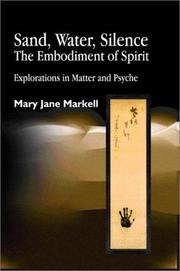
ISBN: 9781843100782 058547110X 9780585471105 1843100789 1846423376 9781846423376 1283903849 9781283903844 Year: 2006 Publisher: London Jessica Kingsley Publishers
Abstract | Keywords | Export | Availability | Bookmark
 Loading...
Loading...Choose an application
- Reference Manager
- EndNote
- RefWorks (Direct export to RefWorks)
Sandplay therapy, which combines the physical actions of play with observation and understanding through the use of symbolism, can be a useful method of treating emotional damage. This book focuses on the theoretical aspects of sandplay therapy, presenting Dora M. Kalff's ideas and drawing out the significance of Kalffian sandplay for therapists.
Creatieve therapie --- Zingeving --- Psychologie --- Sandplay --- Spirit. --- Play --- Sand tables --- Pneuma --- Pneumatology (Philosophy) --- Pneumatology (Theology) --- Holy Spirit --- Soul --- Therapeutic use. --- Man --- Volwassene
| Listing 1 - 10 of 219 | << page >> |
Sort by
|

 Search
Search Feedback
Feedback About UniCat
About UniCat  Help
Help News
News